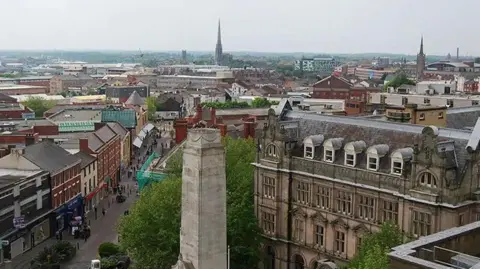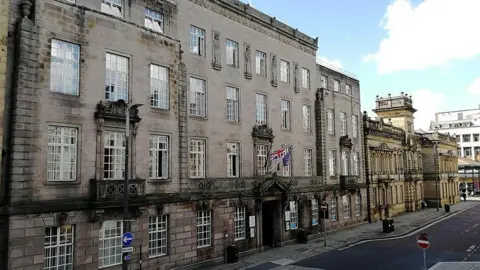Preston, Lancaster and Ribble Valley merger hope
 Preston City Council
Preston City CouncilPreston should merge with Lancaster and Ribble Valley as part of a forthcoming shake-up of local government, the city's councillors are set to argue.
All three political groups on Preston City Council are united in their support for the creation of the new authority.
A government-ordered overhaul will see each of the 15 councils across Lancashire scrapped and replaced with fewer new ones covering larger areas and ministers have asked local leaders to work together to come up with a plan for the entire county.
Agreement has so far though proved elusive but within Preston a cross-party consensus has emerged and councillors of all political colours will push for the same outcome.
If the merger was given a green light it would marry up Lancashire's only two cities, Preston and Lancaster, with its most rural district, in the form of Ribble Valley.
Preston City Council's Labour leader, Matthew Brown, acknowledged that a tie-up with South Ribble, Chorley and West Lancashire might be the more "obvious" option, but he told the Local Democracy Reporting Service he believed merging with Lancaster and Ribble Valley was the "most positive choice" for Prestonians.
 LDRS
LDRSThe creation of a Central Lancashire council appears to be a non-starter after Chorley Council formally backed a configuration that included only themselves, South Ribble and West Lancashire.
South Ribble has yet to debate the matter, but the borough's leader, Jacky Alty, indicated her support for that suggestion late last year.
Brown said he was confident merging Preston, Lancaster and Ribble Valley would create a "powerhouse" area, whose constituent parts would complement each other to the benefit of all three.
He pointed, in particular, to the Samlesbury Enterprise Zone, which straddles the existing Ribble Valley and South Ribble local authority borders.
Government guidance on local authority reorganisation stated that suggested footprints should be based on "sensible economic areas, with an appropriate tax base which does not create an undue advantage or disadvantage for one part of the area".
Brown said the pooling of resources across the new council area would be a boon to Preston.
Meanwhile, Preston's Liberal Democrat opposition group leader John Potter said he also believed a merger with Lancaster and Ribble Valley would be a "fruitful" arrangement.
Conservative group leader Stephen Thompson said he would rather have seen Preston hitch its wagon to South Ribble and part of Chorley, as the area would have made "more sense" geographically.
However, with that arrangement off the table, he said looking towards Lancaster and Ribble Valley "would appear to be the best option".
"The advantage [of that] grouping is a range of excellent businesses, universities and a good urban-rural balance," Thompson said.
Listen to the best of BBC Radio Lancashire on BBC Sounds and follow BBC Lancashire on Facebook, X and Instagram and watch BBC North West Tonight on BBC iPlayer.
